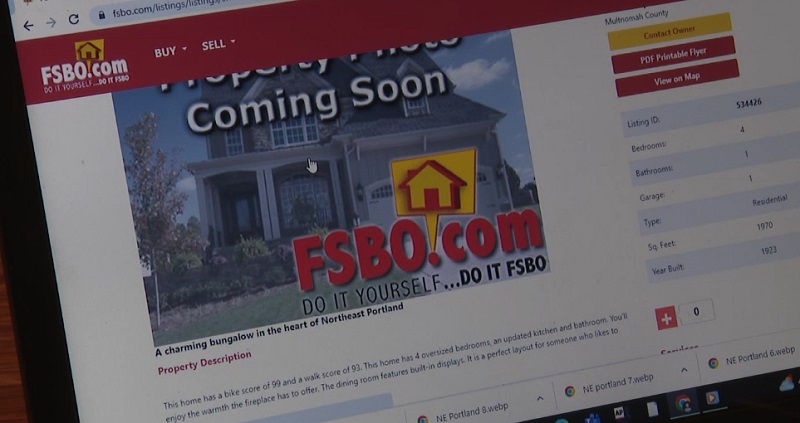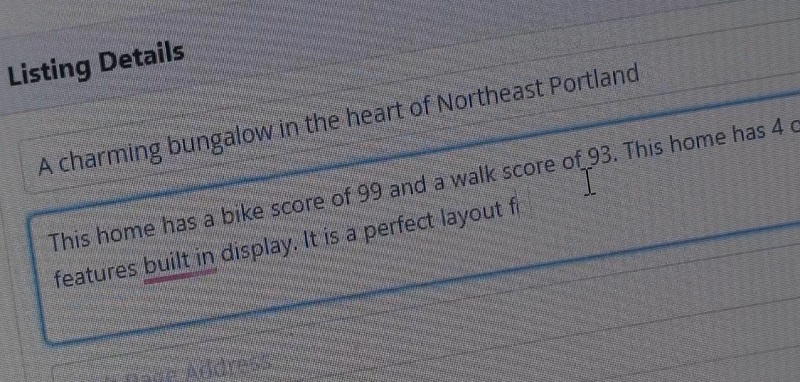PORTLAND, Ore. (KOIN) — A homeowner in Northeast Portland, who rents it out on Airbnb, got a text not long ago from his mortgage broker.
“She’s telling me, ‘Hey, I got a notification your home is for sale,'” said the homeowner, who preferred to stay anonymous. “I’m perplexed.”
Not long after that he got a message from his dad, who is a real estate agent, he told his son someone with the same last name was selling the home for half the market value.
“I’m immediately freaking out soon as this happens,” he told KOIN 6 News.
His house was definitely not for sale. But someone listed his home for sale on a website called For Sale By Owner — FSBO.com — which has a partnership with Redfin. That meant his home ended up listed as “for sale” on their site at that drastically low price.

What happened to his home is part of a much larger scheme where a hacker takes over someone’s Airbnb account, uses it to book a vacation rental but lists it for sale by owner in an effort to show the house to potential buyers, steal their earnest money and then vanish.
“What I’m most concerned about is how easy FSBO.com was able to have somebody list it because that was the crux of the issue. Redfin was just the amplification of that,” the homeowner said. “As I was reaching out to FSBO.com and talking to the support rep, telling them, ‘Hey, this scam has occurred, how has this happened? Can you track them? Do you have an IP address?’ And he kind of chuckled, and said, ‘You know, this happens all the time. I’ve got a news article for you from the East Coast. Sorry to hear it’s now here in the West Coast.’”
A test with permission
With the homeowner’s permission, KOIN 6 News made a Gmail account in his name, then plugged in all the publicly available information about his property, ripped photos of the house from the Airbnb website and paid the $100 fee to FSBO.com — which included a subscription to Redfin.
In mere minutes, his house had once again been listed for sale on FSBO.com — using the exact same words and phrases of the original scammer and once again listed for half the market value.

The next day a real estate agent reached out to the homeowner about seeing his home for sale. But by that time, FSBO.com had taken the listing down.
FSBO.com officials told KOIN 6 News scammers bypass their safeguards by using stolen credit cards to pay for a subscription to their site. The scammers then make the billing address the same as the address they are fraudulently posting.
“We are investigating how this particular type of fraud can be cost-effectively detected on our system, but no safeguards are foolproof, and we encourage owners and property managers who utilize services like Airbnb to regularly check the major real estate listing sites to confirm their property isn’t being offered for sale,” said Michael Malkasian, the company president.
That doesn’t sit well with the Portland homeowner whose house was fraudulently listed.
“I felt like, ‘Isn’t this your whole business?’ Isn’t this what FSBO is supposed to do, is authenticate the identity of the users to not allow scams to happen? It was a poor experience and that is the gap and they have the ability to close that gap, but they are not,” he said.

The FSBO company president said, “Companies like ours in the online property advertising business typically do not have the resources to guarantee that all of the properties displayed on our sites were submitted by the genuine owner or an authorized agent.”
But they also said schemes like this are rare and they’re working to take prompt action to investigate and cancel suspicious listings and to cooperate with law enforcement.
A spokesperson for Redfin told KOIN 6 News that Redfin pulls listings twice a day from FSBO.com
The company said in a statement: “Redfin does not offer the ability to post for-sale-by-owner listings directly on our website, however, we do display listings from some third party sources, including FSBO.com. We immediately remove fraudulent listings as soon as they are brought to our attention. Upon learning of this incident, we reached out to FSBO.com to discuss their processes to identify and prevent fraudulent listings.”
How homeowners can protect themselves
The homeowner said people should not shy away from using Redfin or Airbnb. Instead, he said people need to be diligent about protecting private information.
Additionally, the focus should be to close the gaps that created the issue, pressuring tech companies — who know a scam is happening and don’t respect consumer privacy and information — to actually do something beyond shrugging their shoulders.

Since these online scams are more sophisticated, Redfin now encourages buyers and sellers to work with licensed real estate agents for protection.
As a result of this new elaborate scam, FSBO.com said they have made some changes.
FSBO said they now manually check every new listing to verify the owner is who they say they are. The company said this is tedious but necessary until they can create and implement a more efficient process. Malkasian said most legitimate sellers want their listing activated as soon as possible.
The company said they also have a plan in place to further educate and warn potential buyers using their site of possible red flags when attempting to contact an owner.
The president of FSBO suggested homeowners set up a Google Alert for your personal property address to be notified in case someone fraudulently tries to sell your home.
That’s not foolproof. But it’s a start.